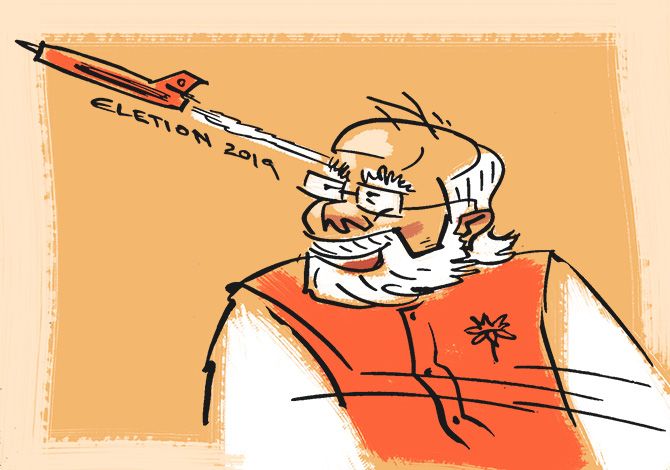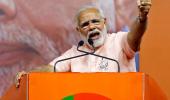'A single seven-year term will free them from party pressures entirely,' says T C A Srinivasa Raghavan.

In the past 30 years which election has been the most difficult to predict?
My attempts to solve this question have led me to formulate a proposition with two parts.
Part 1 is this: The closer you are to one general election, the easier it is to predict the outcome of the next.
In 2014, for example, it was easy to predict at least 275 Lok Sabha seats for the BJP in 2019.
Part 2 is that the closer you get to the next general election the harder it is to predict its outcome.
Would anyone like to wager some money on the number of seats the BJP will win/lose in May this year?
In other words, peoples' political preferences are highly unstable. True, there is a core of stable voters. But as the number of voters grows, so does the number of unstable voters, who make a huge difference at the margin.
What is astonishing is that this degree of instability would not be -- and is not -- tolerated in any other area. But in politics it is.
If we take unstable political preferences as a given -- like air turbulence -- what should be done to mitigate its effects? I have two suggestions below that arise from the two givens of the Constitution.
One, it does not limit the term of a prime minister to just one term.
Two, however, it does limit the term of the Lok Sabha to five years except when an Emergency has been declared.
However, the five-year rule has no logic to it. It is entirely arbitrary. Many countries have less or more.
Also, many countries also limit the term of their heads of government. The USA used to have unlimited terms for the President till they changed it in the mid-1940s.
When taken together, the two Constitutional provisions -- no limit on the PM's terms and the limited term for the Lok Sabha -- constitute a problem for both politics and governance.
The political problem is mostly for parties that don't have dynasties. The BJP and CPI-M, the two major ideological parties, fall in this category. So do large regional parties like the AIADMK, BSP, JD-U and TMC.
We have seen how difficult it has been for such parties to carry on responsibly when the founders or original leaders have passed on. There are no exceptions to this because the new leaders become extremists in order to hang on to their vote shares.
In contrast, in parties where leadership devolves by the dynastic rule, the problem is of poor governance because regardless of how poorly they govern there is no political challenge from within the party.
The Congress at the national level and the SP, the DMK, and a host of other parties at the state level are good examples of this. Thus, can anyone tell everyone else what will happen to the BJD after Naveen Patnaik?
What can be done
Taking everything about India into account, I believe that both these provisions need to be reviewed. They have not worked properly.
Therefore, we need to limit the term of the prime minister (and the chief ministers) to just one term and we need to extend the life of the Lok Sabha and the Vidhan Sabhas to six or seven years.
India, with over 1,300 million people, cannot be governed by the same arbitrary rules as England was in the 17th century. Even with 65 million people it is finding the going hard.
Longer terms will give the PMs/CMs enough time to achieve whatever they think is needed without having to constantly worry about re-election, which can be left to the party.
In fact, a single seven-year term will free them from party pressures entirely.
Both Manmohan Singh and Narendra Damodardas Modi can vouch for this because both have had to face intense pressure from their parties, which has forced them to make mistakes.
By the way, few people know it, but between 1947 and 1955 it was party pressure that led Jawaharlal Nehru to make some very bad mistakes, the worst being his economic policies that followed the Avadi Congress of 1955.
The current five-year rule for the legislatures also means that the fifth year is devoted to populist policies and inaction. In effect, therefore, the term is of four years only.
One other benefit of limiting the terms for the PM and CMs will be that governments cannot be brought down by the legislators midway. The benefits of this cannot be overstated.











